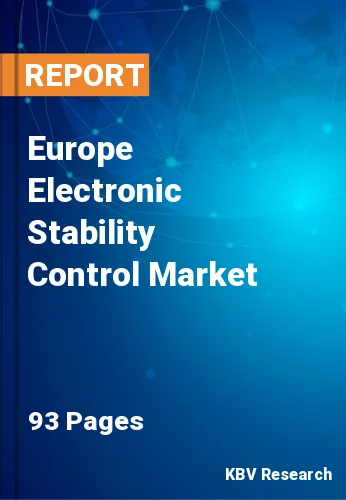The Europe Electronic Stability Control Market would witness market growth of 7.2% CAGR during the forecast period (2022-2028).
ESC systems frequently help to increase traction in off-road settings in addition to their on-road responsibilities because of their capacity to improve vehicle stability and braking. Because of the numerous internal and external conditions that might be present at any one moment, as well as the manufacturer's programming and testing, the efficiency of traction control systems may differ significantly. Based on the terrain encountered, off-road traction fundamentally differs from conventional operational features of on-road traction.
The path of least resistance is chosen for power transfer in an open differential configuration. This implies that in slick circumstances, whenever one wheel loses traction, power will be counterproductively directed to that axle rather than the one with more traction. ESCs concentrate on stopping wheels whose rotational speed differs significantly from the opposite axles. Off-road use necessitates consistent (or even increased) power delivery to maintain vehicle momentum. In contrast, the vehicle's braking system applies intermittent force over a prolonged time to the slipping wheel until excessive wheel spin is no longer detected. On-road applications frequently supplement rapidly intermittent wheel braking with a reduction in power in loss-of-traction situations.
The UK wants to be the G7 country with the fastest transition to vehicles, according to the Transitioning to zero-emission cars and vans: 2035 delivery plan. Sales of gasoline and diesel vehicles will gradually end by 2030, and by 2035, all new cars and vans must have zero emissions at the exhaust. This proposal will increase demand for zero-emission vehicles with a £2.8 billion package to support the phase-out dates. The growing sales for EVs and other vehicles will increase the usage of ESC systems, thereby surging the market growth in the region.
The Germany market dominated the Europe Electronic Stability Control Market by Country in 2021, and would continue to be a dominant market till 2028; thereby, achieving a market value of $914.8 Million by 2028. The UK market is anticipated to grow at a CAGR of 6.4% during (2022 - 2028). Additionally, The France market would exhibit a CAGR of 8% during (2022 - 2028).
Based on Component, the market is segmented into Hydraulic Unit, Sensors and Electronic Control Unit. Based on Vehicle Propulsion, the market is segmented into ICE and Electric & Hybrid. Based on Vehicle Type, the market is segmented into Passenger cars, Light Commercial Vehicles and Heavy Commercial Vehicles. Based on countries, the market is segmented into Germany, UK, France, Russia, Spain, Italy, and Rest of Europe.
Free Valuable Insights: The Global Electronic Stability Control Market will Hit $13.6 Billion by 2028, at a CAGR of 8%
The market research report covers the analysis of key stake holders of the market. Key companies profiled in the report include Robert Bosch GmbH, Continental AG, Johnson Electric Holdings Limited, Aisin Corporation (Toyota Motor Corporation), Valeo SA, Murata Manufacturing Co., Ltd., Hitachi, Ltd., Knorr-Bremse AG, ZF Friedrichshafen AG (TRW), and Mando Corporation (Halla Group).
By Component
By Vehicle Propulsion
By Vehicle Type
By Country
Our team of dedicated experts can provide you with attractive expansion opportunities for your business.

